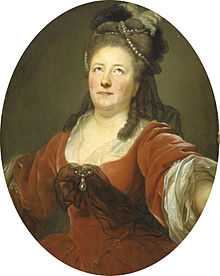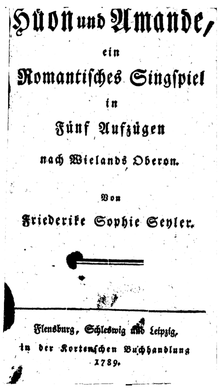Friederike Sophie Seyler


Friederike Sophie Seyler or F.S. Seyler, formerly Friederike Sophie Hensel (1737 or 1738, Dresden – 22 November 1789, Schleswig, née Sparmann; also referred to as Sophie Friederike), was a German actress, playwright and librettist. Alongside Friederike Caroline Neuber, she was widely considered Germany's greatest actress of the 18th century.[1] Her libretto for the Singspiel Oberon (originally titled Huon and Amanda) was a major inspiration for Emanuel Schikaneder's libretto for the opera The Magic Flute. She was briefly married to the actor Johann Gottlieb Hensel and then married the famous theatre director Abel Seyler. As an actress, she was known for portraying passionate and tragic characters. She was a member of Konrad Ernst Ackermann's troupe and performed at the Vienna Burgtheater, before joining the Hamburgische Entreprise and the travelling Seyler Theatre Company. Gotthold Ephraim Lessing lauded her as one of Europe's finest actresses in his influential work Hamburg Dramaturgy.
Work
She wrote several plays, including Die Entführung oder die zärtliche Mutter, which was much acted in the 1770s. She also wrote a libretto for a Singspiel based on the poem Oberon, titled Hüon und Amande, that became a great success in Hamburg. Her libretto was since re-adapted by Karl Ludwig Giesecke to provide a libretto for Paul Wranitzky, but without crediting her. Wranitzky's version became the first opera performed by Emanuel Schikaneder's troupe at their new theater, that established a tradition within the company of fairy tale operas that was to culminate later in Mozart's and Schikaneder's opera The Magic Flute. Oberon as written by Sophie Seyler and built upon by Giesecke is similar to The Magic Flute in its plot and characters, and a number of the singers who participated in Giesecke/Wranitzky's Oberon took similar roles in the later opera. According to Peter Branscombe, "it has long been recognized that Giesecke, the named author of Wranitzky's libretto, deserves little credit for what is largely a plagiarism," concluding that "Giesecke's "Oberon, König der Elfen is hardly more than a mild revision of Seyler's book." After the theatrical success of Giesecke's plagiarized version (and also after Seyler's death), Seyler's original was renamed Oberon and performed under this title.[2]
While she was regarded as Germany's most prominent living actress, she also had a reputation for being unusually conceited and difficult to work with.[3] Richard E. Schade describes her as "a beautiful, if rather solidly built and domineering leading lady."[4] According to Phyllis Hartnoll, "even Lessing, who detested her, had to admit she was a fine actress. In private life she was malicious and intriguing, her character contributing to the downfall of the Hamburg enterprise."[5]
Background

She was born in Dresden as the only child of the doctor Johann Wilhelm Sparmann, and was the granddaughter of court architect Matthäus Daniel Pöppelmann, who built Zwinger. Yet, she came from a broken home and fled from an arranged marriage. She joined the theatre in 1754.[6]
In 1754, she married actor Johann Gottlieb Hensel, but they divorced already in 1759. In 1772, she married her great love and admirer, the Swiss-born theatre director Abel Seyler, after a long-standing romance. He had been the main backer of the Hamburgische Entreprise and was the founder of the Seyler theatrical company.[7]
Her step son was the banker Ludwig Erdwin Seyler, the head of Berenberg Bank who married into the Berenberg/Gossler banking dynasty. Her step daughter Sophie (Marie Katharina) Seyler (1762–1833) was married to the prominent Sturm und Drang poet Johann Anton Leisewitz.
Works (selection)
- Die Familie auf dem Lande, 1770
- Die Entführung, oder Die zärtliche Mutter, Drama 1772. Wehrhahn Verlag Laatzen (2. ed. 2004). ISBN 3-86525-012-2.
- Hüon und Amande, 1789
Literature
- Wilhelm Kosch, "Seyler, Friederike Sophie", in Dictionary of German Biography, eds. Walther Killy and Rudolf Vierhaus, Vol. 9, Walter de Gruyter, 2005, ISBN 3110966298, p. 308
- Paul Schlenther: Abel Seyler. In: Allgemeine Deutsche Biographie (ADB). Band 34, Duncker & Humblot, Leipzig 1892, S. 778–782.
References
- ↑ Susanne Kord (1993). "Tugend im Rampenlicht: Friederike Sophie Hensel als Schauspielerin und Dramatikerin" [Virtue in the Limelight: Friederike Sophie Hensel as actress and playwright]. The German Quarterly, 66(1):1–19.
- ↑ Peter Branscombe, W. A. Mozart: Die Zauberflöte, Cambridge University Press, 1991, p. 28
- ↑ Jan Philipp Reemtsma, Lessing in Hamburg: 1766-1770, C.H.Beck, 2007
- ↑ Lessing Yearbook XII, 1980 p. 81
- ↑ Phyllis Hartnoll, The Oxford companion to the theatre, p. 386, Oxford University Press, 1983
- ↑ Wilhelm Kosch, "Seyler, Friederike Sophie", in Dictionary of German Biography, eds. Walther Killy and Rudolf Vierhaus, Vol. 9, Walter de Gruyter, 2005, ISBN 3110966298, p. 308
- ↑ Paul Schlenther: Abel Seyler. In: Allgemeine Deutsche Biographie (ADB). Band 34, Duncker & Humblot, Leipzig 1892, S. 778–782.
External links
- Literature by and about Friederike Sophie Seyler in the German National Library catalogue
- Friederike Sophie Hensel: Die Entführung oder die zärtliche Mutter, Drama 1772 (PDF)
|